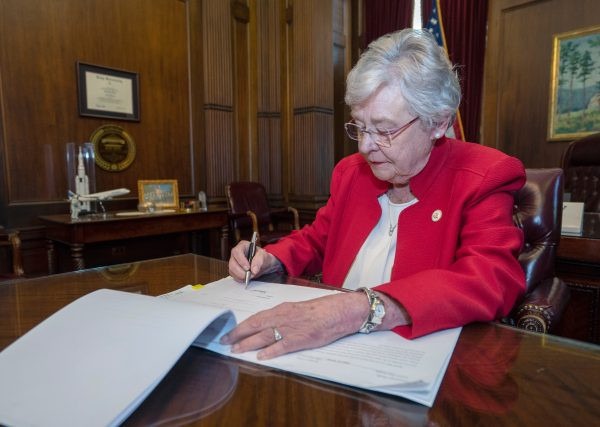Source: Kay Ivey, Twitter post, twitter.com, May 15, 2019
At least five states have passed strict abortion laws in 2019, partially in an effort to challenge Roe v. Wade, the 1973 Supreme Court case that legalized abortion nationwide.
Alabama passed a near-total ban on abortion on May 15, 2019 that is meant to go into effect in Nov. 2019. The law makes abortion illegal in almost all cases, does not have exceptions for rape or incest, and includes felony penalties of up to life in prison for doctors who perform abortions.
Alabama State Representative Terri Collins stated the law “is about challenging Roe v. Wade and protecting the lives of the unborn because an unborn baby is a person who deserves love and protection.”
Leana Wen, MD, President and CEO of Planned Parenthood, stated, “Politicians in Alabama just passed the most extreme and dangerous policy since Roe vs. Wade… Alabama is putting women’s lives at even greater risk.”
Georgia, Kentucky, Ohio, and Mississippi passed “fetal heartbeat” laws that ban abortion when a “heartbeat” has been detected, generally around six weeks.
According to Jennifer Kerns, MD, MS, MPH, OB-GYN at the University of California at San Francisco, “At six weeks, the embryo is forming what will eventually develop into mature systems. There’s an immature neurological system, and there’s a very immature cardiovascular system. [The “heartbeat”] is a group of cells with electrical activity… We are in no way talking about any kind of cardiovascular system.”
Sarah Horvath, MD, OB-GYN with the American College of Obstetricians and Gynecologists, further explained, “What’s really happening at that point is that our ultrasound technology has gotten good enough to be able to detect electrical activity in a rudimentary group of cells.”
Georgia’s law is set to go in effect on Jan. 1, 2020. However, the Kentucky law has been struck down by a federal judge and the Ohio and Mississippi laws are currently being challenged in courts.
Eleven other states have “fetal heartbeat” bills in the works, including Florida, Illinois, Louisiana, Maryland, Minnesota, Missouri, New York, South Carolina, Tennessee, Texas, and West Virginia.
As of May 1, 2019, Guttmacher Institute lists 18 states with laws that would make abortion illegal or otherwise restrict access should Roe v. Wade be overturned: nine states have bans and five have other restrictions from before Roe v. Wade still on the law books, six have near-total bans, and seven have laws saying abortion will be restricted as much as possible.
Elizabeth Nash, MPP, Senior States Issue Manager at the Guttmacher Institute, stated, “There’s a real momentum around banning abortion at the state level and it’s stemming from the shift in the U.S. Supreme Court.” That shift was the Trump administration’s addition of two conservative Associate Justices, Neil Gorsuch and Brett Kavanaugh.
Some states have chosen to pass laws that would keep abortion legal if Roe v. Wade were overturned by the US Supreme Court. New York passed a law on the 46th anniversary of Roe v. Wade on Jan. 22, 2019. At least nine other states have followed suit, including California, Connecticut, Delaware, Hawaii, Maine, Maryland, Nevada, Oregon, and Washington.
Sources:
Erin Corbett, “Abortion Is Still Legal in All 50 States,” fortune.com, May 17, 2019
Nicole Chavez, “The Rising Wave of Abortion Restrictions in America,” cnn.com, May 18, 2019
Erin Corbett, “New York’s Landmark Abortion Rights Bill Protecting Roe v. Wade Decision Now Law,” fortune.com, Jan. 23, 2019
Amanda Michelle Gomez, “States Are Already Pre-Filing ‘Fetal Heartbeat’ Bans for the New Year,” thinkprogress.org, Dec. 20, 2018
Guttmacher Institute, “Abortion Policy in the Absence of Roe,” guttmacher.org, May 1, 2019
Katie Reilly, “Alabama’s Abortion Ban Is Designed to Challenge Roe v. Wade at the Supreme Court. Here’s What Happens Next,” time.com, May 15, 2019
Rachael Rettner, “Is a ‘Fetal Heartbeat’ Really a Heartbeat at 6 Weeks?,” livescience.com, May 17, 2019
Adam Rogers, “‘Heartbeat’ Bills Get the Science of Fetal Heartbeats All Wrong,” wired.com, May 14, 2019
Leana Wen, Twitter post, twitter.com, May 14, 2019
